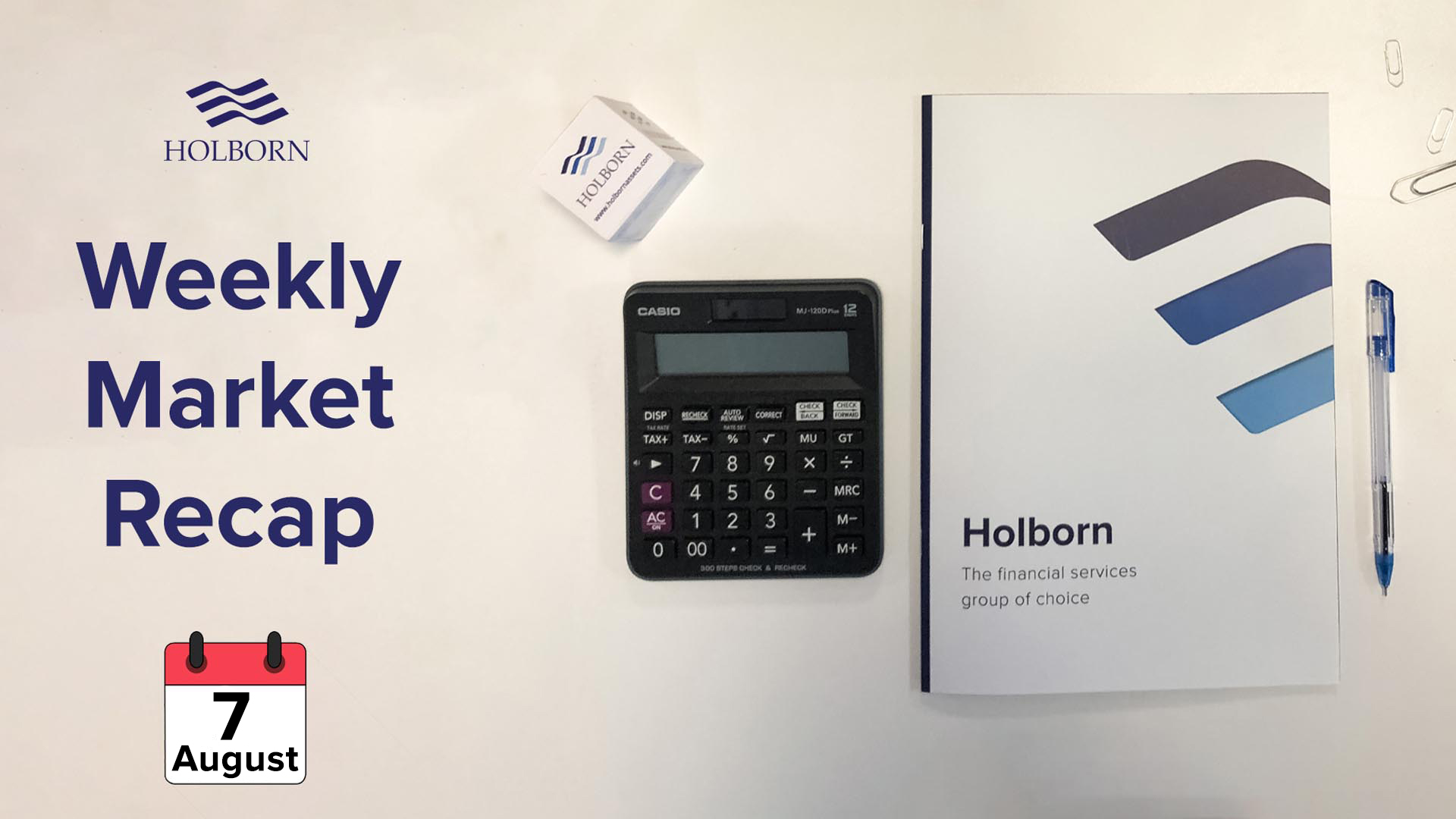
Posted on: 7th August 2020 in News
Good day, this is Holborn’s weekly market recap. Let’s take a look at this week’s news in finance.
News in finance: On Monday, the Swiss Federal Statistical Office announced that the country’s Consumer Price Index (CPI) stood at -0.9%, on an annualised basis, in July. This has been the sixth month in a row that consumer prices have fallen in Switzerland.
In eurozone’s financial updates, IHS Markit published its euro bloc Manufacturing Purchasing Managers’ Index (PMI) for July which came in at 51.8. The figure showed that eurozone’s manufacturing activity expanded for the first time since early 2019.

In the UK, an IHS Markit report noted that “the UK’s manufacturing sector started the third quarter on a much firmer footing, with output growth hitting a near three-year high and new orders rising for the first time in five months.”
In the US, the Institute for Supply Management (ISM) Manufacturing PMI climbed to a 15-month high coming in at 54.2 in July. The figure surpassed analysts’ expectations.
News in finance: On Tuesday, the Reserve Bank of Australia (RBA) announced that it would keep interest rates on hold at 0.25%. The RBA’s Governor Philip Lowe stressed that the central bank’s accommodative approach would be maintained as long as it required.
News in finance: On Wednesday, Statistics New Zealand reported that the country’s unemployment rate fell to 4.0% in the second quarter of 2020, defying experts’ predictions. However, economists suggest that the rate is likely to increase in the next quarter as the government’s extended wage subsidy is on track to end next month.
In eurozone’s financial updates, according to a report released by IHS Markit, the euro bloc’s Composite PMI came in at 54.9 in July, the highest level recorded since June 2018. Economists had forecast a 54.8 figure.

Eurostat reported that retail sales in the eurozone rose by 1.3% on a yearly basis and by 5.7% on a month-to-month basis in June. According to Eurostat’s report, sales jumped 16.5% in Spain and 13.8% in Italy but fell by 2.5% in Austria and 1.6% in Germany when compared with May’s figures.
News in finance: On Thursday, the Bank of England (BoE) announced that it would keep its benchmark interest rate unchanged at 0.1%. The BoE’s governing board, commenting on the pandemic’s impact, noted that the UK’s economy would likely struggle for some time and forecast that the unemployment rate would reach 7.5% by the end of the year.
News in finance: On Friday, the General Administration of Customs of the People’s Republic of China published a report which showed that the country posted a trade surplus of $62.33 billion, beating the $42 billion economists had expected. Market analysts suggest that “much of the recent resilience of Chinese exports has been due to shipments of masks, medical products and work-from-home equipment.”
In the US, the Bureau of Labour Statistics announced that the Non-Farm Payrolls (NFPs) rose by 1.76 million in July. Economists polled by Reuters had forecast 1.6 million jobs were added in July. According to the Bureau’s report, the country’s unemployment rate dropped to 10.2% from 11.1% in June.
From all of us at Holborn Assets have a lovely weekend!
We have 18 offices across the globe and we manage over $2billion for our 20,000+ clients
Get started
Digital Assets: From Fringe to Framework A Responsible View for Internationally Mobile Investors Executive Summary Digital assets have moved from the fringes of finance into mainstream discussion. The arrival of...
Read more
Across the global expatriate market, one product category is showing unprecedented momentum in 2025: Indexed Universal Life (IUL). As client expectations move toward solutions that combine long-term protection, tax-efficient wealth...
Read more
Chancellor Rachel Reeves delivered her second Autumn Budget in dramatic circumstances, after the Office for Budget Responsibility (OBR) accidentally released its full economic outlook online 45 minutes before her speech....
Read more
In today’s world, much of our lives are lived online. From email accounts and social media profiles to digital wallets and online businesses, we’re building a digital legacy—often without realising...
Read more